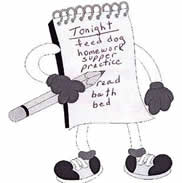ORGANIZATIONAL SKILLS WHICH PART OF ORGANIZATION Many parents and teachers complain about children's organizational skills, and many kids admit that organizational skills cause them problems in school. Although disorganization is identified as the culprit, parents, teachers, and kids themselves are unclear about what is specifically wrong. By examining the elements of ELEMENTS OF ORGANIZATIONAL SKILLS Putting like things together. This concept is basic to organization. Whether kids learn to pair socks, put their library books together in a special place on a shelf, organize incomplete homework separate from complete homework, or arrange their favorite singers’ CD’s together, they’re learning an essential first of organization that will help them find what they want when they need it. This skill is so basic that even preschool children can begin learning to put like things together.
Scheduling. After kids calculate the time it takes for their daily activities and study, they can prepare a weekly schedule to visually understand and communicate their activities for the week. Kids can keep their own schedule and add their personal activities to a family schedule that can be posted on a refrigerator or bulletin board. In this way, parents and kids can better manage carpools, taxiing, and duplication of activities. It may take a fair amount of juggling on the parents’ part to cope with gymnastics, soccer, and music lessons of several children. A realistic schedule helps. Remembering. Assignment books are great for remembering assignments, as long as kids don’t forget to use them. Kids like to believe they’ll remember their homework or activities without writing them down, but it often is only an excuse for forgetting to do something or be somewhere. Kids have amazing facility at remembering what’s important to them, but falter when their responsibilities are not first priority. Parents who make lists for their own remembering are good role models for kids who must also learn to keep track of responsibilities. Kids can invent their own special system for remembering, but they need to prove it’s effective if they plan to continue to use it. Prioritizing. As kids’ lives get busier, it’s important to join your kids in prioritizing their most important responsibilities. Discussing priorities helps kids learn to evaluate their activities and determine which ones they absolutely must do and those they can accomplish only if time allows. Prioritizing helps families to balance work and play. Doing homework before watching television may not be a choice kids prefer, but they’ll find it more effective. Eliminating. In the process of prioritizing, parents and kids together may decide that kids simply have to drop a sport or activity. By discussing what should be eliminated, kids clarify their own values while understanding their parents’ perspectives on activities as well. Sometimes, you may have to insist that kids drop an activity, but it’s better to make this a joint decision and ask for their thoughts on which activity they’d like to drop. There may be times when you’ll disagree. Listen to your kids’ perspectives, but don’t hesitate to speak up if you consider their choices harmful.
Establishing good habits. Study, chores, and organization become much more automatic and less frustrating if kids develop good habits. Doing schoolwork and chores before play is a good habit that prevents procrastination. Rechecking assignments is a good practice for curbing carelessness. It’s also important to avoid bad habits because they, too, can become automatic. Bad habits like skipping breakfast, arguing daily, staying up late, or ignoring homework cause great problems for kids. Maintaining flexibility. The quotation I enjoy sharing is, “Habits are the best of servants, and the worst of masters.” It’s true that good habits can foster efficiency, but it’s just as true that kids who are mastered by inflexible habits lose opportunities for creativity, spontaneity, and fun. Intentionally teaching kids to make exceptions to their schedules can prepare them to adjust to change and can enhance their lives without destroying their organization and efficiency. ©2012 by Sylvia B. Rimm. All rights reserved. This publication, or parts thereof, may not be reproduced in any form without written permission of the author. |
©2008-2014 by Sylvia B. Rimm. All rights reserved.
Report any problems with this site to Webmaster@sylviarimm.com


 Predicting time. Sensitize kids to how long it takes them to bathe, dress, brush their teeth, or walk to the bus stop and it will help them to be ready on time for school or activities. Noticing how much time it takes to study for a test or complete a math assignment will help them plan. Making them time-conscious will permit them to allocate enough preparation and prevent the daily frenzy that some parents and kids experience when they’re always late. You may want to use a timer or stopwatch at first to measure and chart their time. Once they’re more realistic about their needed preparation, they’ll learn how much time to allow.
Predicting time. Sensitize kids to how long it takes them to bathe, dress, brush their teeth, or walk to the bus stop and it will help them to be ready on time for school or activities. Noticing how much time it takes to study for a test or complete a math assignment will help them plan. Making them time-conscious will permit them to allocate enough preparation and prevent the daily frenzy that some parents and kids experience when they’re always late. You may want to use a timer or stopwatch at first to measure and chart their time. Once they’re more realistic about their needed preparation, they’ll learn how much time to allow. Reviewing. The process of review helps kids to realize that their decisions aren’t permanent and can be revised at a later date. Prioritizing and eliminating will need repetition every few months if schedules become too hectic again. Kids can add activities they’ve dropped or drop some they’ve added as they learn to evaluate their daily lives and interests regularly.
Reviewing. The process of review helps kids to realize that their decisions aren’t permanent and can be revised at a later date. Prioritizing and eliminating will need repetition every few months if schedules become too hectic again. Kids can add activities they’ve dropped or drop some they’ve added as they learn to evaluate their daily lives and interests regularly.